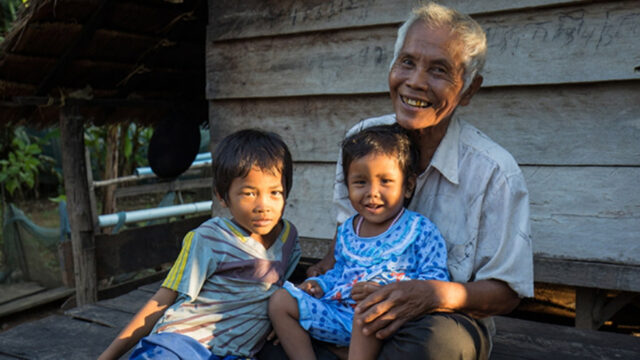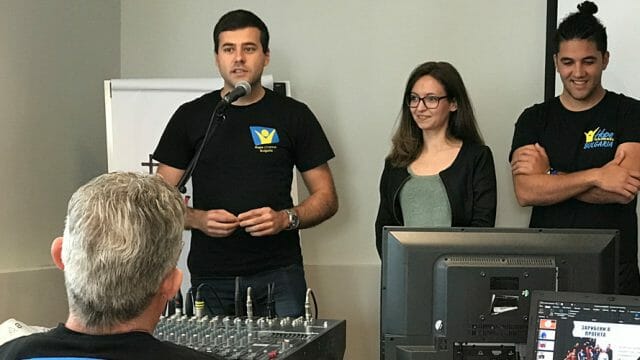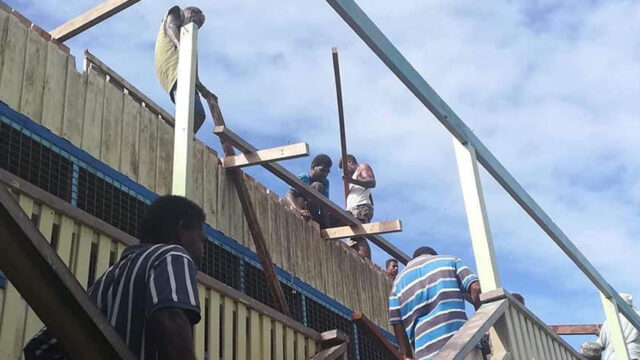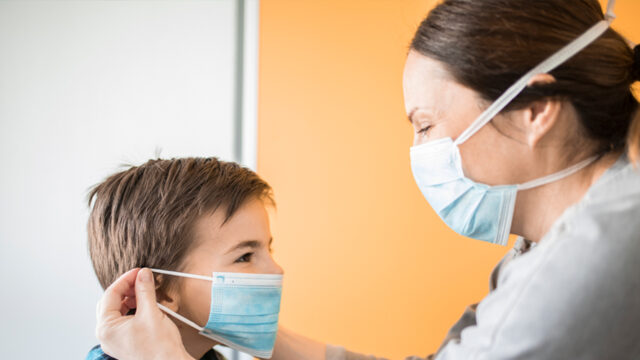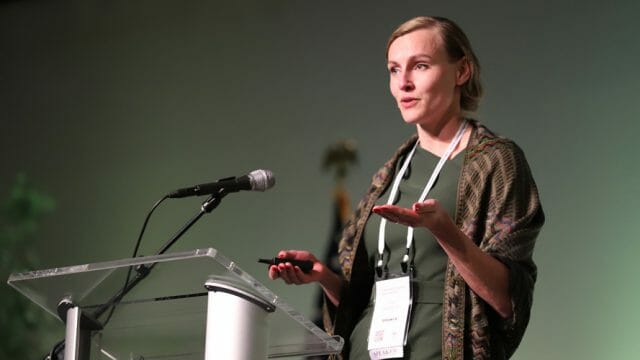Partnership with the Adventist Church assists the most vulnerable members of society.
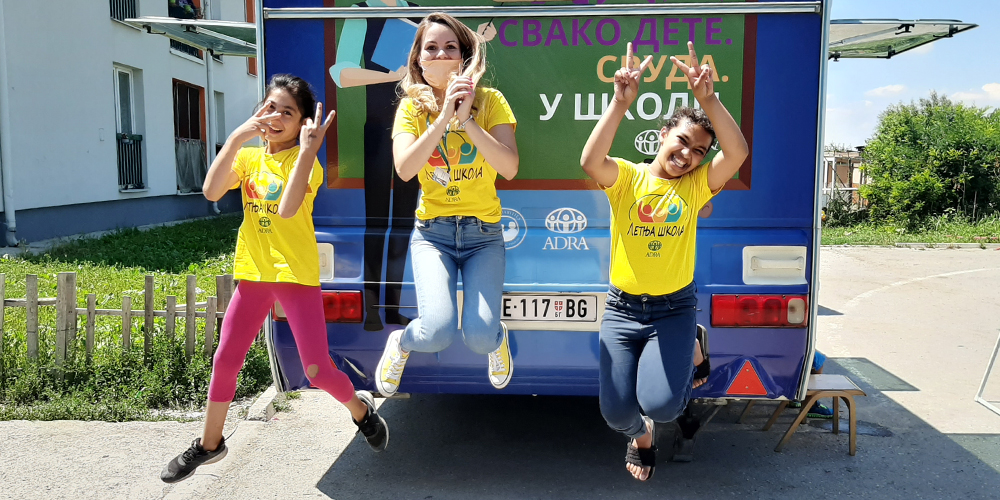
During the COVID-19 pandemic, the Adventist Development and Relief Agency (ADRA) and the Seventh-day Adventist Church in Serbia found multiple ways to serve society’s most vulnerable members.
Adventist young adults ages 18-26, with financial and logistical support from their local churches and ADRA, shopped for food and other supplies and then delivered much-needed parcels to church members who are elderly or disabled. Dragan Grujicic, president of the South-East European Union Conference, joined these young Adventists as they delivered food to people who could not leave their homes during the COVID-19 lockdown.
ADRA’s work went far beyond assisting church members, however. The agency intensified its efforts to boost the physical and emotional well-being of key groups it was already serving.
“Our three target groups became additionally vulnerable in this period: the homeless, children from the Roma community, and women and girls from the refugee and migrant communities,” Igor Mitrović, country director for ADRA in Serbia, said. “ADRA adapted its ongoing programs to respond to the new needs in these communities — or, to put it more accurately, to the old needs made even more urgent.”
Helping the Homeless
Homelessness is a significant problem in Serbia. Between 5,000 and 10,000 people are without homes in the capital of Belgrade, according to local authorities. “The official social and health system is not able to effectively prevent homelessness or meet the needs of homeless people,” Mitrović said.

This inadequacy became painfully visible during the first weeks of the COVID-19 lockdown in March. According to Mitrović, the entire city of Belgrade had only one homeless shelter with a capacity of 114 people.
ADRA’s response was immediate. Volunteers from local Seventh-day Adventist churches packed and distributed parcels of food and other essential items to 1,000 homeless individuals. In addition, ADRA continued its ongoing services to the homeless, which became even more crucial during the pandemic.
- WASH services. ADRA operates a specially designed and adapted bus called “DrumoDom” (RoadHome). It contains two showers, a toilet, and a laundry room. Homeless people can enjoy a hot shower and drop off their dirty laundry to be washed at the laundry facility in ADRA’s office building. ADRA provides 20 showers and 10 laundry services daily.
- Health-care services. ADRA’s field outreach medical teams perform counseling and medical checkups for the homeless in the DrumoDom and in a building provided by the Central Seventh-day Adventist Church in Belgrade. If needed, individuals are referred to other health-care providers. ADRA provides escort and transportation and covers the cost of care. Every day, between 20 and 100 homeless people receive essential medical treatment through ADRA.
- Psychosocial support. ADRA provides mental health support through information sharing, counseling, referrals to other responders, transportation to health-care institutions, and mediation in communication.
“Given the additional needs for proper hygiene, health services, and mental health support as people suffer the effects of COVID-19, these services are vital for the homeless, who are often invisible to other responders,” Mitrović said.
Educating Roma Children
The Roma minority is the single most vulnerable national group in Europe. According to the Serbian government’s Strategy for Social Inclusion of Roma, there are at least 250,000 Roma in Serbia, and the majority of them live in poverty.
One of the key needs is helping Roma children complete their education. In conjunction with the Serbian government, surveys conducted by UNICEF show that fewer than two-thirds of children from Roma settlements complete primary school. With the advent of COVID-19, the likelihood of Roma children missing out on education drastically increased.
Serbia, like many other countries, closed schools and switched schooling to online/distance learning. However, most Roma children in Serbia lack the technology to participate. They have no smart devices and no stable internet connection. Their families live in substandard settlements in overcrowded shacks with minimal space for learning. They receive little support from their families because their caregivers are often illiterate or are absent during the day while working.
ADRA was already supporting the education of about 100 Roma children in Serbia. Since March, these learning programs have been adapted to the circumstances of COVID-19.
- Online support. In Belgrade, ADRA’s Community Center, where Roma children receive tutoring from ADRA teachers, had to close during the lockdown. To maintain their students’ progress, ADRA’s staff teachers held online support sessions with the same children they had worked with during the pre-COVID-19 period. Four additional Adventist volunteers came on board to assist children while schools were shut down. The tutors connected with the children via video calls to help them with their schoolwork.
- This support was critical for 30 Roma children who managed to complete school. They were lucky enough to have electronic devices and internet access. Others did not share the same fortune. ADRA is raising funds with the business sector to obtain devices and internet connection for the remaining children and is building a volunteer base of tutors to reach as many children as possible.
- School on Wheels. ADRA’s School on Wheels is an adapted RV trailer turned into an attractive learning space. It is driven to the Roma communities, where ADRA teachers offer a fun and educational time for Roma children. By reading books in the School on Wheels, using its library, and interacting with the teachers, students are getting better prepared for school. The School on Wheels suspended its operations during the peak of COVID-19 infections in April but then resumed its work with additional precautionary measures.
- Summer school. ADRA’s summer school takes place in the ADRA Community Center and in the Roma settlements. Teachers lead out in fun recreational and educational activities to help minimize the drastic summer knowledge loss due to inactivity. The students are “warmed up” and prepared for the new school year starting in September. A total of 100 children took part in this year’s summer school.
“Investment in education is the only proven contributor to eliminating poverty and increasing chances for upward social mobility,” Mitrović observed. “ADRA is providing these students a way out of the vicious cycle of multigenerational poverty, even while the pandemic makes their situation more difficult.”
Supporting Refugee Women and Girls
COVID-19 further complicated the life of refugees who are migrating through Europe in search of a home. Confined to the refugee/migrant centers during Serbia’s lockdown, refugee women and girls, in particular, faced additional risks of deteriorating living standards and exposure to violence, including sexual exploitation and abuse.
In March 2020, the ADRA Women’s Center in Belgrade adapted its gender-based violence prevention and empowerment program to continue offering support during the pandemic. The Women’s Center provided remote psychological first aid through online groups and individual counseling for the 100-plus women living in the Krnjača Asylum Center near Belgrade.
In the online groups, refugee women received information about COVID-19 protective measures, mental health, gender-based violence, activities for themselves and their children, and more. The groups provided mutual support as the women coped with the challenges of the pandemic. Women facing more severe or sensitive concerns could receive individual counseling from ADRA’s social worker and translator via a phone call or WhatsApp conversation.
“Women stressed the importance of this service even when it is provided online, because it gives them space to release stress, to be heard, and to receive information that can help them deal with the situation,” Mitrović said.
After the relaxation of restrictive measures in the country, ADRA went back to offering in-person activities in the Women’s Center while maintaining appropriate social distancing and protective measures. Refugee women enjoyed volleyball matches, exercise groups, crafts, and other recreational activities. The center also offered transformative workshops on preventing gender-based violence, improving interpersonal communication, and dealing with stress.
In total, more than 70 percent of women in the Krnjača Asylum Center benefited from ADRA’s services during the pandemic.
During these difficult times, ADRA continued to distribute dignity kits containing sanitary towels, soap, and underwear to refugees and migrants in three asylum centers in Serbia. Migrants faced increased needs for basic items during the lockdown due to lack of cash support, inability to leave the centers, and inability to work. At the same time, ADRA faced distribution challenges: an increased number of people in the centers, difficulty in acquiring specific hygiene items, and the inability to work in person.
Despite these challenges, ADRA distributed 990 dignity kits to migrants during the spring and summer months.
“Our commitment to meeting the needs of vulnerable individuals is permanent,” Mitrović said. “ADRA continues to support them during the pandemic, grounded in its belief in the sanctity and dignity of every human life.”
The original version of this story was posted on the Adventist Development and Relief Agency site.


